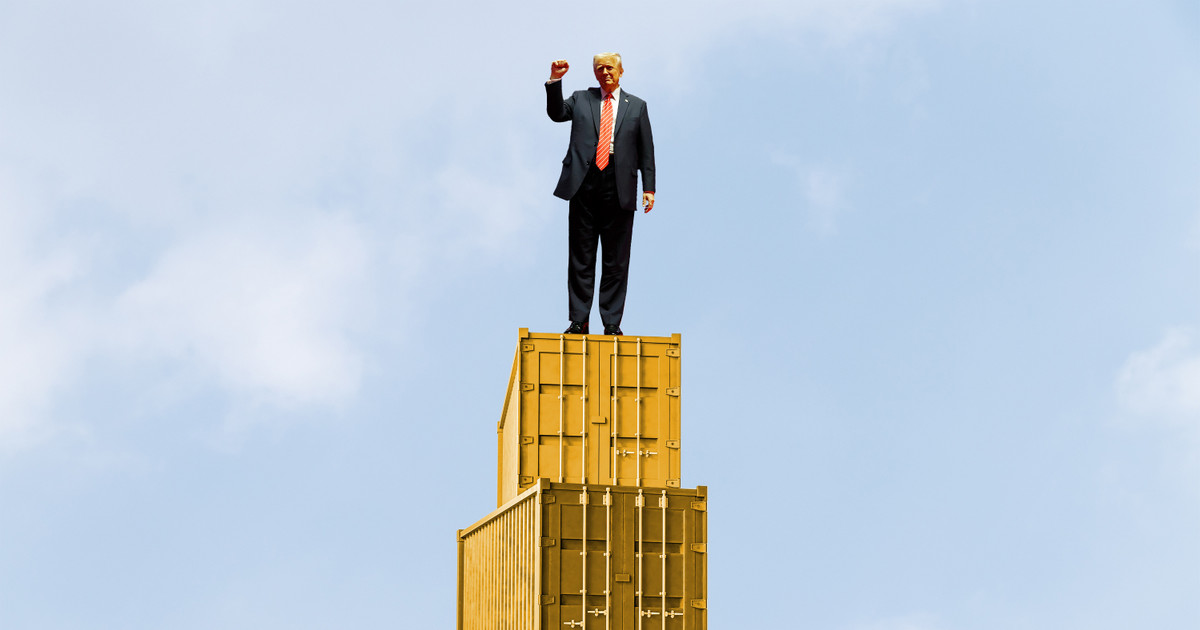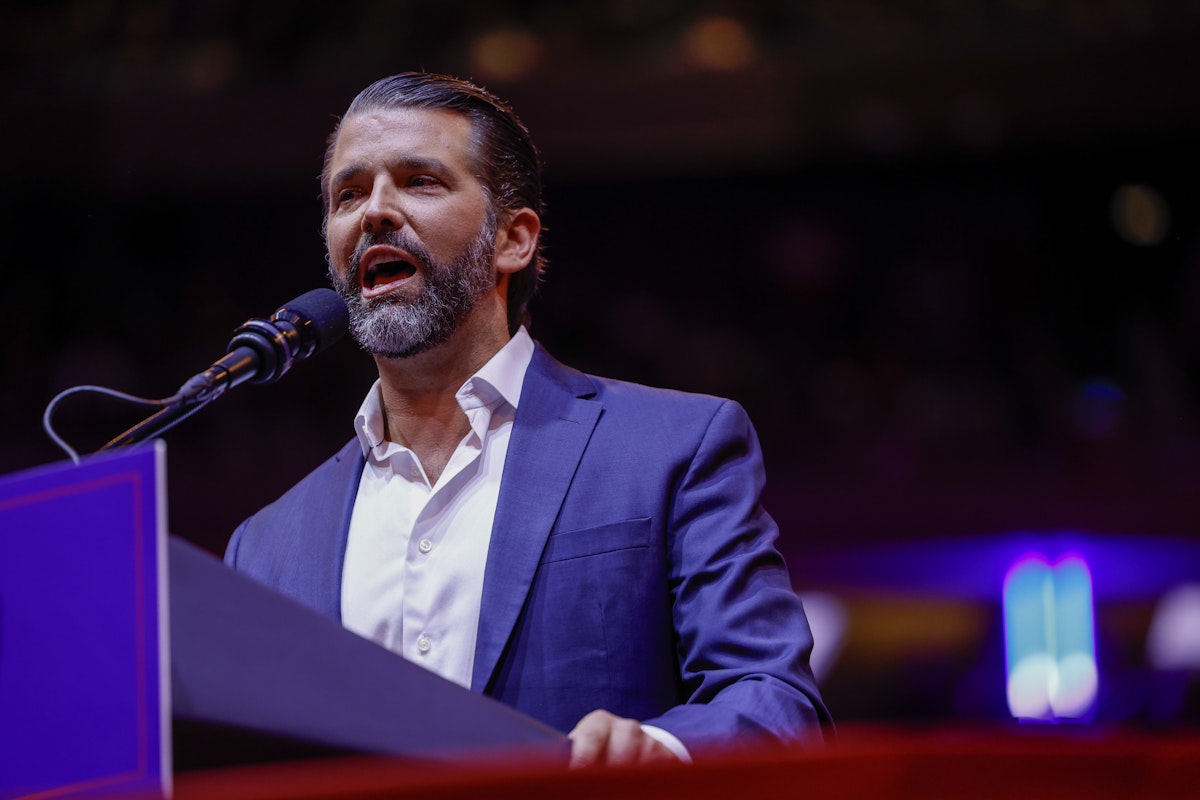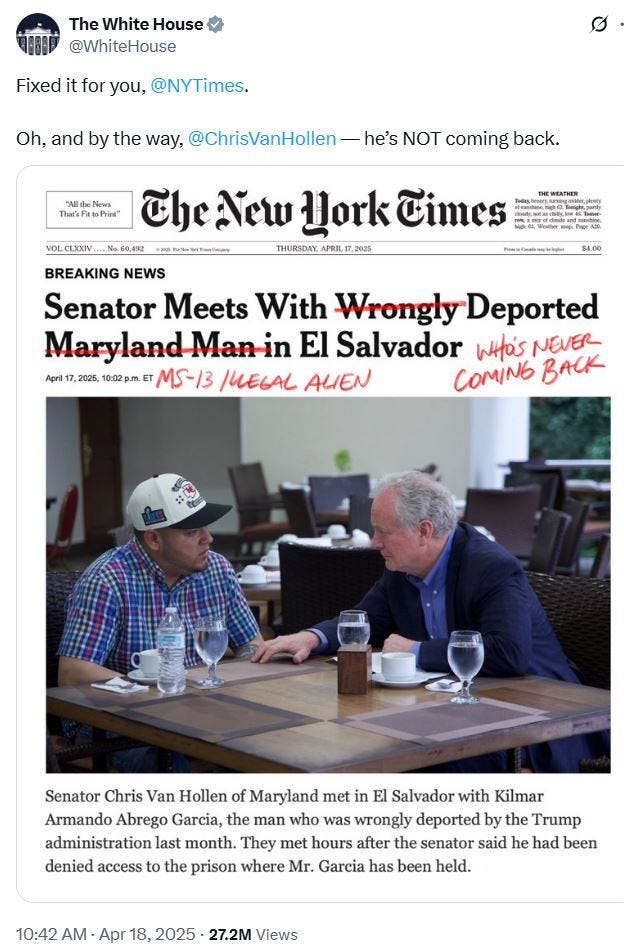
Politically Connected Firms Benefit From Trump Tariff Exemptions Amid Secrecy, Confusion
April 22, 2025
“Full-Blown Meltdown”: Don Jr. and MAGA Rage as GOPers Turn on Hegseth
April 22, 2025THEY WERE GATHERED AGAIN, the lawyers and the judge, at an hour when the courts of a well-ordered society should be still.
This country once divided against itself over the fate of fugitive slaves. Those “held to service or labour in one state,” in the Constitution’s shameful euphemism, were to “be delivered up on claim of the party to whom such service or labour may be due.” Our greatest president gave his life to end the fettered bondsman’s two hundred and fifty years of unrequited toil.
Our current president is no emancipator. Indeed, history will count him among the traffickers. With disturbing zeal, he seeks to consign men to a foreign dungeon. The possibility of their innocence seems beyond him. He dispatches them without a flicker of due process. He invokes the Alien Enemies Act of 1798, a law never used—that cannot be used—in peacetime. A law that can only be applied to citizens of nations attacking the United States. But the president has invoked it against alleged members of Tren de Aragua, a Venezuelan gang. The leaps in logic are vast, but the president carries on.
This is what brought the judge and the lawyers together. The last time, it was a Saturday. The ACLU had scrambled into court to stop the departure of two planeloads of men to El Salvador. So sudden was the hearing that Judge James Boasberg, of the federal district court in Washington, D.C., appeared on Zoom without his robe. He grasped the enormity of the government’s action, and ordered the planes turned around. The government ignored him. Hours later, Nayib Bukele, the autocrat of El Salvador, shared footage of the men being hauled into his infamous CECOT prison.
This time, it was a Friday evening. Boasberg’s first, flouted order had been reviewed—and vacated—by the Supreme Court. The Court had not met the moment. It had, however, said that men may not be removed without “notice and an opportunity to challenge their removal.” Now the administration was ignoring this order, too.
According to the ACLU’s lawyer, men were being rounded up and transferred to a detention center in north Texas. That location was, it seemed, no accident. A judge in south Texas had already enjoined the removal of detainees from a center in his district. The government was moving men to a spot beyond his reach.
At the new facility, immigration officers were handing out notices. In English. The notices asserted that their recipients had been deemed members of Tren de Aragua and would be removed imminently. “If you desire to make a phone call, you will be permitted to do so,” they read. Not a word about judicial review. Not a whisper about habeas corpus.
Some men were already on buses headed for the airport. The goal was (once again) to spirit people away before a court could intervene. And once removed, the government would argue that no court even has the power to intervene. Judge Boasberg had before him nothing less than a plot, by the American government, to disappear people in the style of an authoritarian regime.
Lincoln would have seen the allegory. The administration sought to complete this sordid operation on Good Friday—the time, the Gospels say, when the sun’s light failed and darkness covered the land.
The ACLU had asked the government, by email, whether it was distributing the notices. The government replied that it had not given notices to the two men the ACLU was representing in a suit in north Texas. It refused to say anything about the others.
The New York Times describes a scene of panic and chaos at the detention center:
One man called his wife to say Venezuelans in the facility were being given notices accusing them of being part of the Tren de Aragua gang. . . . He sent her a video posted on TikTok in which men in red jumpsuits crowded around a cellphone, saying they had been given a document ordering their swift removal from the United States because they were “alien enemies” and represented a terrorist threat.
One of the men, identifying himself with the last name Prieto, said there had been no order for his deportation and that his immigration documents were in order. “I have American children,” he said. “They brought me here, and I’m innocent. They arrested me without any warrant.”
He added, “For nothing, for nothing they brought me here.”
Court hearings are never quite as tense as the movies might suggest. Except this one was. The government said that no one would be removed on Friday, but that it reserved the right to remove people on Saturday (meaning, it seemed, any moment after midnight). In the silence that followed, time felt suspended.
The notices were very troubling, Boasberg said. They likely did not comply with the Supreme Court’s order. But he believed the justices had tied his hands. The ACLU had also filed an emergency motion in north Texas, and that petition had raced up to the high court. Boasberg said the matter now rested there.
The evening dragged on. No word from the Supreme Court. But the gears, they turned. Late on Good Friday, as Christ was laid down, the justices grappled with the fate of the men at the Bluebonnet Detention Facility in Anson, Texas. Dark was the night, cold was the ground.
AT ABOUT 1 A.M. SATURDAY, the Court spoke: None of the men shall be removed, pending further notice. As Justice Alito observed in a dissent issued a day later, this order is extraordinary, and not just for its time of release. The Court did not wait for a substantive ruling from the trial or appellate courts. It acted without input from the government. And it did not identify any authority to grant classwide relief under the circumstances. “This Court,” Alito wrote, “has never held that class relief may be sought in a habeas proceeding.” (Which is not to say that it never will.)
This is the third order the Court has issued on the president’s program of extraordinary rendition. It is an outgrowth of the Court’s failures in the first two.
The first order came in Trump v. J.G.G., an appeal of Boasberg’s original ruling. Justice Sotomayor, in dissent, wrote with urgency. Quoting the record, she noted that inmates at CECOT “are rarely allowed to leave their cells, have no regular access to drinking water or adequate food, sleep standing up because of overcrowding, and are held in cells where they do not see sunlight for days.” Yet the government had sought to rush detainees there, she went on, before a court could determine whether they were gang members or whether the Alien Enemies Act had even validly been invoked.
But the majority refused to engage. Normally, a plaintiff can challenge arbitrary government action under the Administrative Procedure Act, and Boasberg had granted classwide relief under that statute. In a hasty and threadbare opinion, the Court responded that only individual habeas petitions, brought in the jurisdiction of confinement, would do. The majority made no mention of the government’s appalling conduct.
Here is Justice Sotomayor, rightly incensed:
The Government’s conduct in this litigation poses an extraordinary threat to the rule of law. That a majority of this Court now rewards the Government for its behavior . . . is indefensible. We, as a Nation and a court of law, should be better than this.
Boasberg has since found probable cause to hold the government in criminal contempt for ignoring his order to turn the planes around. That matter is ongoing.
The Court’s second order came in Noem v. Abrego Garcia. An immigration order instructed the government not to deport Kilmar Abrego Garcia to El Salvador. The administration whisked him there anyway. He spent several weeks at CECOT. He remains confined.
The government at first confessed error. But then it fired the lawyer who confessed on its behalf. It now claims not only that it will not seek Abrego Garcia’s return, but that no court can so much as push it to do so.
Justice Sotomayor again saw things clearly. “The Government’s argument . . . implies,” she wrote, “that it could deport and incarcerate any person, including U. S. citizens, without legal consequence, so long as it does so before a court can intervene.” That view, she said, “refutes itself.”
The Court ruled unanimously that the government may not strand Abrego Garcia in a foreign prison. But the controlling opinion was weak and mealy-mouthed. The district judge may direct the government to “facilitate” his release, as she had ordered, but not to “effectuate” it without first defining the term (presumably to mean something short of a requirement). And more broadly, she must show “due regard” for the executive’s prerogatives in foreign affairs.
The Court’s moderate conservatives—Chief Justice Roberts, Justice Kavanaugh, and Justice Barrett—are failing the test. To her credit, Barrett dissented in J.G.G. But the other two helped fracture the Alien Enemies Act proceedings, turning one case before Judge Boasberg into scattershot habeas proceedings around the country. This gave rise to the game of hide-and-transfer the ACLU struggled against on Good Friday. And in Noem, the three signed on to language that, while tolerable under a normal presidency, has only encouraged a rogue one. When Noem returned to the trial court, the administration—with the help of its sidekick Bukele—launched a fresh campaign of stonewalling and intransigence.
But perhaps, with the third order, the shift is here. Consider what the justices have watched.
The district judge allowed Abrego Garcia’s counsel to question government officials about what, if anything, the government is doing to secure his release. The government filed an emergency appeal. The Fourth Circuit shot it down the next day. “It is difficult in some cases to get to the very heart of the matter,” Judge J. Harvie Wilkinson, an esteemed conservative judge, wrote for the court. “But in this case, it is not hard at all.” The government claims that it may “stash away residents of this country in foreign prisons” without due process, and that, “because it has rid itself of custody,” there “is nothing that can be done.”
Having acknowledged a constitutional emergency, Wilkinson made an eloquent attempt to lower the temperature:
It is, as we have noted, all too possible to see in this case an incipient crisis, but it may present an opportunity as well. We yet cling to the hope that it is not naïve to believe our good brethren in the Executive Branch perceive the rule of law as vital to the American ethos. This case presents their unique chance to vindicate that value and to summon the best that is within us while there is still time.
Here was the voice of the wise old statesman. Here was a call for calm, dignity, and the rule of law.
The administration’s reply?

Juvenile taunts. Additional defiance. Feeble claims, untested in court, that Abrego Garcia is in MS-13. . . . And the events of Good Friday.
Now does the Supreme Court understand?
THE HOPEFUL VIEW IS THAT the administration’s authoritarian engines may soon run out of steam. Good lawyers don’t like making cruel, dishonest arguments. As they flee the Justice Department, the government may find that its radical legal program starts to sputter and slow. Meanwhile, the Supreme Court may stiffen up, and public opposition may grow increasingly energetic. Various setbacks could, in theory, induce the administration to drop its worst aspirations.
The more sober view is that this is a hinge moment of history. On the left, calls for mass civil disobedience. On the right, murmurs of a need for dictatorship. We are coming upon a season of fever and visions—of signs and prophecies. A time may soon come when words, however reasoned, will not suffice. When no ruling from the Court can constrain the executive or preserve the peace. The mind drifts to Bleeding Kansas. To Harpers Ferry.
What a mess we are in.
I think of Lincoln’s First Inaugural, delivered a month before the guns opened fire at Fort Sumter:
We are not enemies, but friends. We must not be enemies. Though passion may have strained it must not break our bonds of affection. The mystic chords of memory, stretching from every battlefield and patriot grave to every living heart and hearthstone all over this broad land, will yet swell the chorus of the Union, when again touched, as surely they will be, by the better angels of our nature.
The plea failed. And the war came.
Yet the union endured. What Lincoln offered, in the end, was a prayer. An intercession for a great nation in its hour of peril. The better angels still call to us, rage man or devil never so much.
Great Job Corbin K. Barthold & the Team @ The Bulwark Source link for sharing this story.




